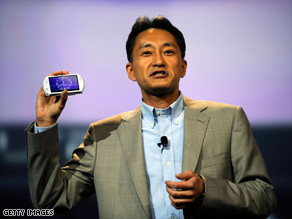
With the big three gaming-system makers all previewing new or upgraded motion-sensing controllers this week, a new arms race is under way in the video game industry.
Joysticks and push-button controllers seem to be on their way out, replaced by simpler, more intuitive devices — similar to Nintendo’s Wii — that let gamers move their arms and legs to guide their avatars’ movements onscreen. Sony Computer Entertainment on Tuesday unveiled an unnamed prototype of a motion-sensing system with a controller that can be wielded as a sword, a baseball bat, a gun and even a bow and arrow. “It far surpasses anything you can get on the market now,” creator Richard Marks told an audience at the Electronic Entertainment Expo (E3) in Los Angeles, California. Sony said the system will hit stores in the spring of 2010. Sony’s news came on the heels of Monday’s announcement by Microsoft that it has developed a gaming system, code-named “Project Natal,” that eliminates controllers entirely by tracking players’ body movements. No launch date was announced for Natal, which will work on the company’s Xbox 360 consoles. Not to be outdone, Nintendo on Tuesday announced more incremental technological advancements to its popular Wii system, which pioneered the use of motion-controlled gaming upon its launch in 2006.
Don’t Miss
Microsoft will make Xbox games without controllers
Video game industry in transition as E3 opens
By emphasizing motion-sensing game play, the three gaming heavyweights appear to be trying to appeal to casual gamers — the ones who have bought more than 50 million Wii consoles — as well as hard-core gaming fans. Marks narrated a live demonstration of the Sony prototype on Tuesday. While he spoke, another man wielded a hand-held remote with a small, glowing globe on its end. As the man swung the controller, a disembodied sword moved back and forth on a giant video screen above. “Notice how fast it’s tracking his motions,” Marks said. Earlier in Sony’s two-hour presentation, Sony Computer Entertainment CEO Kazuo Hirai introduced the PSP Go, a successor to the popular PSP portable gaming device. The PSP Go is less than half the size of the original PSP and will come with integrated Wi-Fi and 16G of flash memory. It will go on sale October 1 in North America for $249. Much of the rest of Sony’s event was devoted to video previews of such anticipated games as “Assassin’s Creed II” (on sale holiday 2009), “Final Fantasy XIII” (spring 2010), “God of War III” (March 2010) and “MadNation Racers,” a customizable, Mario Kart-like game to be released sometime next year. Nintendo found itself in unfamiliar territory at its own E3 keynote. The Japanese company, which has been on top of the video game world in recent years because of its Wii system, struggled to match the star power and excitement generated by Microsoft’s news Monday that it has developed games that can read players’ movements without the aid of remote controls. (It didn’t hurt that Microsoft trotted out Paul McCartney and Steven Spielberg, among other celebrities.) Nintendo said an add-on to its Wii remote, called Wii Motion Plus, will make Wii games feel more natural and intuitive. The company’s president, Satoru Iwata, also debuted a new device called the Wii Vitality Sensor, which is intended to help players visualize and control their pulses. Most video games serve to amp people up. The Vitality Sensor, which clips onto the end of a finger to measure heart beats, can help players do the opposite, he said. “Maybe everyone under pressure in our stressful society can use this as a way to relax,” Iwata said. “It may not be long before games are also used to let people unwind or even make it easier to fall asleep.” Nintendo also said Tuesday it wants to continue to expand its reach. Market research shows there are 149 million people in the United States, Japan and six European countries who don’t currently play video games but who would be open to trying, Iwata said. The company said it aims to capture those users and appeal to new demographics of people, particularly women. To that effect, the company announced games where players go shopping and solve Nancy Drew-style murder mysteries, which it says are targeted at female video-gamers. A demonstration of a new four-player Mario game for the Wii drew applause from the audience, and a new sports game for the Wii, called “Wii Sports Resort,” was another highlight of the hour-long presentation. Nintendo also said it aims to make video games more social. Like Microsoft, Nintendo announced that Facebook will soon be accessible through the hand-held Nintendo DSi. Also, in a move that mirrors what’s happening with games for the iPhone, Nintendo announced systems to let players create their own games and characters using Nintendo hardware. The largest annual trade show for video game enthusiasts, E3 will continue through Thursday at the Los Angeles Convention Center.
